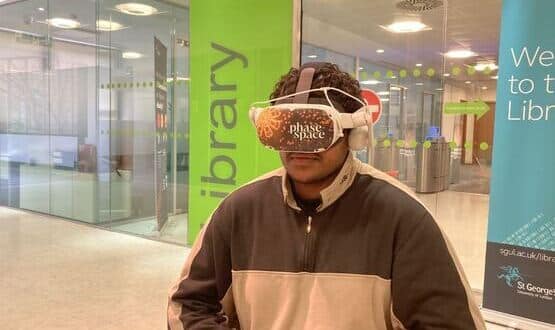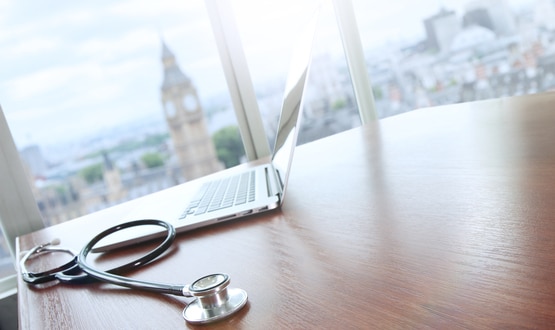New virtual reality experience improves student mental health
- 12 April 2024

St George’s University of London have led revolutionary work to improve student mental health by using sessions in virtual reality to reduce stress and anxiety. Preliminary results are being presented at A Metaverse for the Good conference in Barcelona.
The number of students living in the UK who disclosed a mental health condition to their university increased five-fold from the academic year 2010/11 to 2020/21, while 57% of respondents in a 2022 Student Minds mental health charity survey self-reported a mental health issue. This VR experience could offer a transformational solution to combat this growing problem.
The VR content, which has been developed by Phase Space Ltd working with St George’s, University of London, uses proven hypnosis-based stress management techniques, including breathing and visualisation, reimagined for VR.
It harnesses the power of VR to supercharge the process of relaxation and uses breathtaking graphics that focus the headset wearer’s attention to achieve a deep state of calm within minutes.
One hundred St George’s healthcare students were recruited to the trial between October and November 2023. They were randomly assigned to view the VR content – focused on dealing with exam stress – either using a Phase Space headset or as a 2D video on their smartphone. Both groups completed a seven-minute VR session every day for five days.
Before and after each session, participants were asked to report how calm, stressed, and anxious they felt on a scale of 0 to 10. Students in the VR headset group showed greater improvements in all measures immediately after the sessions compared to the control (smartphone) group.
In the headset group, their feeling of calm increased with a score of 5.6 before the trial to 7.5 after the sessions, stress decreased from a score of 5.0 to 3.2 and anxiety decreased from 4.4 to 3.0.
Using standardised scales typically used in psychiatry, the students also reported their levels of happiness, calmness, stress, sadness, anxiety, wellbeing and depression at the start of the trial and at a follow-up session two weeks later.
After two weeks, levels of student wellbeing increased and levels of perceived stress decreased in the VR headset group. There were no changes between the pre-intervention and follow-up period in the control group.
In response to open-ended questions, 89% of students (42 out of 47) using the VR headset reported that they experienced a therapeutic effect on their emotional wellbeing from the technology. Other themes to emerge from the qualitative feedback were that they felt more calm, confident and ‘recharged’.
Following the positive feedback, the Student Union at St George’s will offer its students regular sessions to use the VR headsets to manage stress in the run-up to exams from late April.
The work at St George’s, University of London is led by Dr Aileen O’Brien, reader in psychiatry and consultant psychiatrist. She said: “St George’s students played a fundamental role in developing the anxiety-reduction modules used for the study.
Ultimately, we hope it will pave the way for VR to be added to the repertoire of student support offered by St George’s, University of London and across the higher education sector for the first time.”
Zillah Watson, co-founder and chief executive of Phase Space, said: “Phase Space remains committed to pioneering evidence-based solutions that make a lasting impact on the mental health and wellbeing of young people, and this research with St George’s, University of London is a significant step forward.
The trial and content creation were funded by UKRI Innovate UK as part of the Mindset programme to expand the scale of the VR technology with the aim to embed this in universities across the UK.




